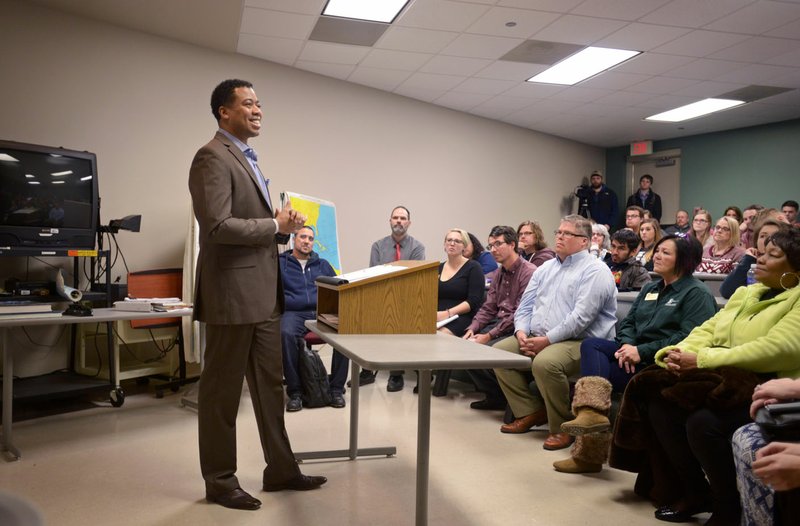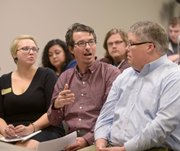BENTONVILLE -- The featured speaker during Northwest Arkansas Community College's annual Martin Luther King Jr. program discussed King's life and asked students and staff members to reflect on what it means to be marginalized in America.
Being marginalized in America means being "placed or kept in a place of insignificance, denied access to people, to power and to resources needed to help you reach your true potential," said Todd Kitchen, the college's vice president of student services.
Quotable
“In a sense we’ve come to our nation’s capital to cash a check. When the architects of our republic wrote the magnificent words of the Constitution and the Declaration of Independence, they were signing a promissory note to which every American was to fall heir. This note was a promise that all men, yes, black men as well as white men, would be guaranteed the “unalienable Rights” of “Life, Liberty and the pursuit of Happiness.” It is obvious today that America has defaulted on this promissory note, insofar as her citizens of color are concerned. Instead of honoring this sacred obligation, America has given the Negro people a bad check, a check which has come back marked ‘insufficient funds.’”
— Martin Luther King Jr., from his “I Have a Dream” speech, Aug. 28, 1963
King believed lingering effects of slavery marginalized blacks, leading to little opportunity for social mobility. He set out to cure the social ills of society, Kitchen said.
Kitchen, who is black, addressed several dozen students and fellow staff members packed into a Burns Hall classroom Thursday in what was the 14th annual Martin Luther King Jr. Speech at the college. He encouraged the audience to "be an agent of change to help ensure all people are given an opportunity to succeed."
His speech was followed by a spirited conversation involving audience members on the topic of race.
Kitchen, 47, gave an example from his own life when he felt marginalized. He was in high school in 1987 when he went to his guidance counselor seeking advice on selecting a college. That guidance counselor told him he ought to consider options besides college.
"This counselor unknowingly destroyed a dream, crushing confidence and sentencing that young man to a life of mere surviving, instead of learning, growing and thriving," Kitchen said.
Kitchen used that example to illustrate how discrimination based on skin color and other characteristics can hold people back.
"People find themselves in a struggle for survival because someone or some institution focused on the color of their skin, the accent of their voice, the lack of a label on their clothing, and judged them unfit for the benefits or opportunities that America promises to all," he said.
But there are those who see past skin color, Kitchen said. A mentor who helped Kitchen attain his doctorate was a middle-aged white woman, whom he described as his "saving grace."
"There are people who do not look like you who do have your very best interests in mind," Kitchen said.
The conversation following Kitchen's speech touched on current events. One person asked Kitchen about the boycott of this year's Academy Awards because of the lack of minorities represented among the award nominees, and what outcome would count as a "win" in that situation.
Quotas don't work, Kitchen said.
"When we feel comfortable with one another, with one another's differences, and when my loss doesn't equate to your win -- that's when we've won," he said.
Gulizar Baggson, executive director of budget and analytical services at the college, asked Kitchen about his reference to "the system" and whether the problem is with the system or the people in charge of it.
"People administer and manage the system, I agree fully," Kitchen said. "When I say 'the system,' systems that train and educate people with a mentality that's not open to diversity, to equality, to social justice -- that's what has to be addressed."
Chris Huggard, a history professor, brought up the 2012 book "The New Jim Crow" by Michelle Alexander, which he said his honors class will be reading this semester.
"We tend to think we're colorblind in our society, but speaking of systems, the criminal justice system needs a lot of reform," Huggard said. "And I think it is largely people, but also the system can be such that it compels people to think and behave a certain way."
C.J. Dillahunty, a student, asked whether there's a way to change the mentality of the system.
"Systems are the byproduct of people," Kitchen said. "If there's a change that needs to occur, it's in individuals."
Understanding how the systems are created is key, said Sevin Gallo, a history professor.
"That's what we're here to do. To understand the history and politics of how the system came about, and to understand it's not natural," Gallo said. "People aren't naturally bigoted or prejudiced or sexist. It's constructed. It has a history and you can understand why people believe and think the way they do. And when something becomes historical and understandable, then that means it's changeable. Because if it's not natural, it's changeable."
Dillahunty, 22, of Rogers said he -- like many other students -- attended the King program in part because of the offer of extra credit from his teacher. Nevertheless, he said he enjoyed it.
"I especially liked the discussion at the end. I like to hear different points of view," he said. "It's very educational and informative as well."
NW News on 01/22/2016


